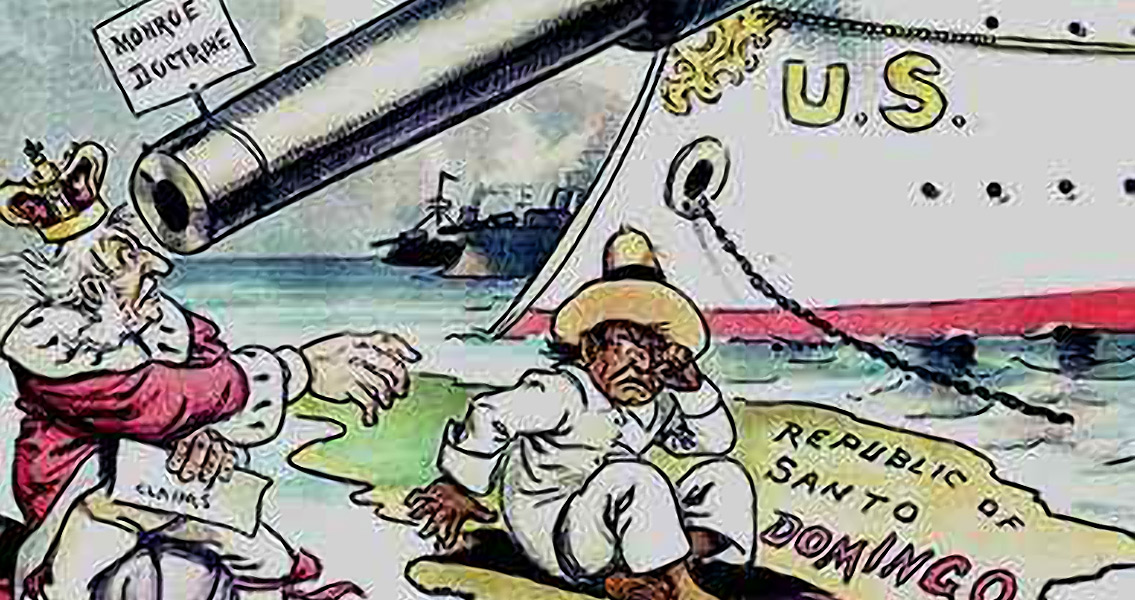<![CDATA["The American continents … are henceforth not to be considered as subjects for future colonization by any European powers." Declared the USA's fifth president, James Monroe on 2nd December, 1823. Quickly becoming a cornerstone of US Foreign policy, the Monroe Doctrine moved from seemingly simple beginnings to play a crucial role in international relations over the next decades. Even now, one could argue that the consequences of James Monroe's declaration continue to influence the world. Monroe's Secretary of State, John Quincy Adams, played a crucial role in shaping the policy and the wording of the declaration. Over the following years its interpretation altered and shifted, the doctrine coming to be invoked in a number of ways which seemed far removed from the initial intention. Like so much in this period, the Monroe Doctrine is best viewed as being a consequence of the Napoleonic Wars. The United States feared that following years of inward facing conflict, the powerful European monarchies might once again turn their attentions to the Western Hemisphere in an attempt to recapture their former colonial territories and distract from the continued disorientation and political unrest at home. Meanwhile, Monroe had overseen a substantial increase of American territory. Before becoming president he had orchestrated the Louisianna purchase, doubling the size of the USA, and following his election he oversaw the acquisition of Florida from Spain. At the same time, he oversaw drastic western expansion, further cementing the US' position as the dominant power on the North American continent. The Monroe Doctrine can be viewed as a culmination of these two factors, a hands off warning to Europe, particularly after the Russian Tsar's claim that all areas north of the 51st parallel, stretching 100 miles into the Pacific, were under Russian jurisdiction. Adams had publicly rejected this claim to the Russian foreign minister, telling him "American continents are no longer subjects of any new European colonial establishments." In the same period, a series of revolutions in South and Central America had all but removed the Spanish influence in the region. Latin America had become increasingly crucial to American trade, providing access to vital resources, and markets for American produced goods. The Monroe Doctrine was therefore also a warning to France and Spain in particular against attempting to reestablish their former colonies in the newly independent republics, while also clearly rebuffing British overtures of forming an alliance against the two powers; which would likely have undermined the image of the US as a strong, self sufficient power. For two decades the doctrine was rarely invoked, with both France and Spain launching military interventions into South America with no US retaliations. In 1842 however, a new interpretation of the doctrine was revealed when president John Tyler used it to justify the US' seizure of Texas from Mexico. At the turn of the twentieth century, the doctrine again came to be used in justifications for US involvement in the Carribean and South America, on the basis that the governments there needed to maintain order within their own boundaries. An infamous incident came in the Platt Amendment to the Cuban-American treaty which brought the Spanish-American War to a close. The 1898 war had officially been launched to free Cuba from Spanish colonial rule, and yet the Platt Amendment placed restrictions on Cuban freedom which would last until Castro's revolution in 1959. By the time of the Cold War, US foreign policy towards Latin America had changed drastically. The Monroe Doctrine attempted to justify US involvement in South America as a means to repel European imperialism, but in reality it set a precedent for US intervention against anything it deemed contrary to its interests. As events such as the Bay of Pigs incident, the Iran Contra Scandal or the US involvement in the coup in Chile lead by General Augusto Pinochet show, defiance against imperialism evolved into aggressive unilateralism across North and South America. ]]>
Monroe Doctrine Speech Delivered to Congress
